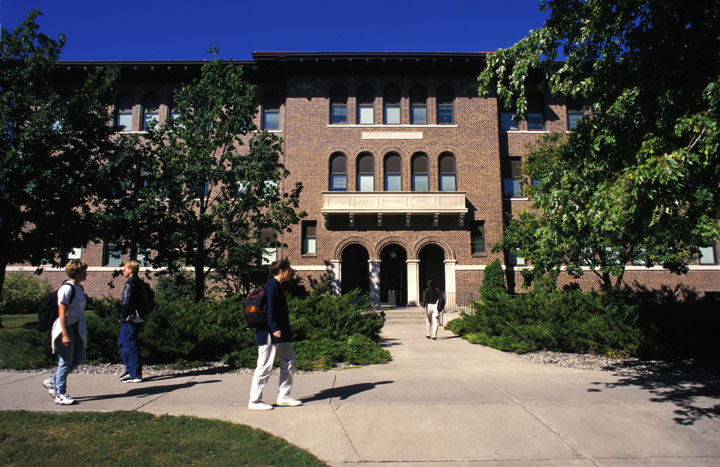Counselor Education
The Counselor Education Program welcomes applications from all persons who meet the entrance requirements and highly encourages members of culturally-diverse groups to apply.
All applications for the program are due February 1st. Applications received after February 1st are reviewed on a space-available basis. The requirements for full standing admission include:
- A completed application
- A minimum undergraduate cumulative GPA of 3.0 on a 4.0 scale, or a minimum GPA of 3.0 on 10 semester credits of graduate coursework*
- Personal and professional references
- A detailed statement of purpose
Applications can be obtained online at https://www.ndsu.edu/gradschool/apply
*In rare cases, if an applicant does not meet the 3.0 GPA guideline set above, but has between a 2.5 and 3.0 GPA, faculty may consider them for conditional acceptance into the program. In this situation, the applicant must include in the application materials a separate letter explaining the circumstances related to the lower GPA and defining specific measures taken to prepare for current academic success. If faculty members determine the prospective student shows potential as evidenced by their application materials, they will invite them for an interview. If accepted following the interview, they receive conditional acceptance.
Students in conditional standing must then receive a GPA of 3.5 or better for the first 9 semester credit hours, meet disposition requirements, and meet any other conditions set by the Counselor Education faculty. Upon review of the faculty, conditionally accepted students who meet the criteria above receive acceptance; those who do not meet the criteria above will not be permitted to continue in the program.
Financial Assistance
Graduate assistantships are available across campus. Applications are considered on the basis of scholarship, potential to undertake advanced study and research, and financial need. Students must be accepted into the Graduate School before they are eligible for an assistantship.
Counselor Education students must complete the required courses and specialization courses listed below. Electives must be approved by the advisor prior to taking the course(s).
The Counselor Education program does not credential, license, or certify graduates. However, our program meets counseling educational standards and prepares students to meet credentialing, licensure, and/or certification requirements. Students who plan to work outside of North Dakota should discuss their plans with their advisers and review these out-of-state requirements.
Master of Education
| Code | Title | Credits |
|---|---|---|
| Required Courses | ||
| EDUC 703 | Research, Measurement and Program Evaluation | 3 |
| CNED 710 | Counseling Techniques | 3 |
| CNED 711 | Counseling Theory | 3 |
| CNED 712 | Counseling Across the Lifespan | 3 |
| CNED 713 | Assessment Techniques | 3 |
| CNED 714 | Career Counseling and Testing | 3 |
| CNED 715 | Professional Orientation and Ethics | 3 |
| CNED 716 | Social and Cultural Foundtions of Counseling | 3 |
| CNED 720 | Group Counseling | 3 |
| CNED 732 | Family Counseling | 3 |
| CNED 734 | Dynamics of Addiction | 3 |
| CNED 731 | Counseling Children and Adolescents | 3 |
| CNED 794 | Practicum/Internship (Practicum) | 3 |
| CNED 794 | Practicum/Internship (Internship) | 6-9 |
| Specialization Options | ||
| Clinical Mental Health Counseling | ||
| CNED 730 | Crisis and Trauma in Counseling Practice | 3 |
| CNED 723 | Psychopathology and Diagnosis for Counselors | 3 |
| CNED 863 | Advanced Clinical Assessment, Report Writing, & Treatment Planning | 3 |
| CNED 890 | Graduate Seminar | 3 |
| Elective (if doing 6 credits of internship) | 3 | |
| OR | ||
| School Counseling | ||
| CNED 728 | Guidance Administration and Consulting | 3 |
| CNED 729 | Professional K-12 School Counseling | 3 |
| Electives/Teacher Education Courses | 6 (9 if doing 6 credits of internship) | |
| Total Credits (required courses, plus specialty option) | 60 | |
Carol E. Buchholz Holland, Ph.D.
Kansas State University, 2005
Research Interests: School Counseling; Solution Focused Counseling Approaches
Jessica Danielson, Ph.D., LPCC-S, NCC
North Dakota State University, 2017
Research Interests: Female Partner Family Formation, Creative Pedagogy in Counselor Education and Supervision, Marginalized Counselor Identities, Power and Privilege in Academia, and Feminist Issues
Brenda Hall, Ed.D., Emeritus Faculty
Virginia Polytechnic Institute and State University, 1993
Research Interests: Intimate Partner Violence, Relational Cultural Theory, and Collaborative Group Practices Studies
Todd F. Lewis, Ph.D., LPC, NCC
Kent State University, 2002
Research interests: Risk Factors for Drinking during Emerging Adulthood, Theoretical Explanations for College Drinking and Substance Abuse, Substance Abuse Interventions, Motivational Interviewing, Process Addictions, and Quantitative Methods for Investigating these issues.
Jill Nelson, Ph.D.
Kent State University, 2005
Research Interests: Shame and Shame Resilience, Mentoring, Community Well-Being Interventions, and Women's Issues in Higher Education
Jodi L. Tangen, Ph.D., LPC, NCC, ACS
University of North Carolina at Greensboro, 2015
Research Interests: Spirituality/Religion in Counseling, Existential and Jungian Theories, Multicultural and Feminist Theory and Practice, Clinical Supervision, and Relational Depth

